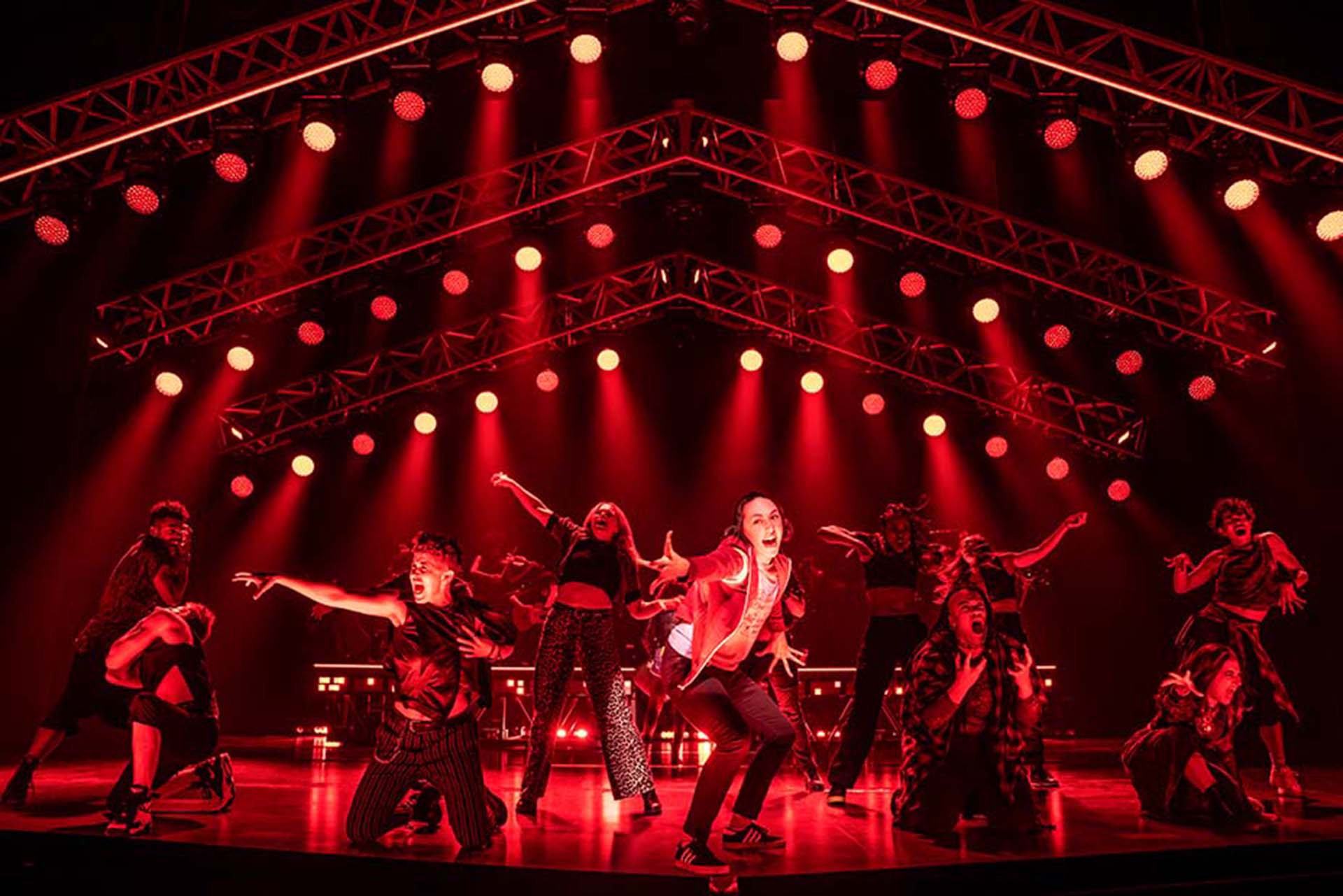What’s Going Down In A Theater

Take the incomprehensibility of everyday life and swallow it whole. That is the confection behind “Jagged Little Pill,” the new musical based on Alanis Morissette and Glen Ballard’s 1995 concept album of the same title. No spoiler alert there, it’s one of the all-time record-breaking albums.
Like Carole King’s “Tapestry,” Morissette’s lyrics tell a story from a woman’s perspective, a perspective that is insular, self-reflective, and very personal. In fact, the feelings and experiences Morissette writes about sound so simple and obvious that it pricks one’s ears to hear it sung out loud. For their vulnerability, however, the songs are arresting.
Musically the work draws on punk and grunge rock, messaging socially conscious issues through distorted electric guitar sounds and heavy metal. With arrangements by Tom Kitt, the loudness factor has been thoughtfully mitigated.
The musical’s soulful sound is a great match for Sidi Larbi Cherkaoui’s unusual choreography. Most important, Diablo Cody’s (“Juno”) book is true to its source. Here, a cacophony of everyday life takes us down the rabbit hole in suburban Connecticut. Exploding idealized icons, the musical delves into common myths about the nuclear family.
Cody’s characters appear as twisted versions of themselves — a mother (Elizabeth Stanley) addicted to opioids, a son (Derek Klena) identified as Captain America, an adopted African American daughter (Celia Rose Gooding), and a dedicated dad (Sean Allan Krill) who brings home law-abiding bacon. That is his commitment to love and affection. He’s a partner in a law firm, and a flawlessly likeable man, albeit addicted to porn.
Like it or not, the plot turns on a contemporary ill, teenage rape. Through that exposure the characters collide, conflating their ethical beliefs with their actual behaviors. Addicted moms and absent dads get their comeuppance, as do idealized young men.
Stanley brings an exquisite voice to her role as the mother. And Krill plays her one-dimensional husband with a single-minded urgency that lifts him above the merely banal. Katherine Gallagher’s Bela, the rape victim, bleeds the story for truthfulness more than empathy. Playing the overprivileged son, Klena manages to break the mold, and his sister, portrayed by Gooding, makes sure of it. There is a wonderful diversity of actors on the stage.
As directed by Diane Paulus, the production running more than two-and-a-half hours, carries a sense of abandon — shades from her earlier revival of “Hair.” But the openness of storytelling meets with a more classical vision here. European choreographer Cherkaoui shapes the dancers’ moves through contemporary dance styles — hip hop and martial arts — as only a master of ballet can.
Known to American audiences for his Beyoncé–Jay Z video, “Apes**t,” set in the Louvre Museum, Cherkaoui’s choreography is anything but cliché. It’s a significant element here, in a musical that begs us to see the obviousness of who we have become. To that end, the production is more than a sugar-coated pill, or a sappy Mother’s Day card.
‘Harry Townsend’s Last Stand’
The darkness inhabiting this season Off-Broadway is ominous with forebodings of cataclysmic events such as the ones we are informed of daily. Actually, it’s more than just darkness. Communing with and about death feels all pervasive in so many productions, including “A Thin Place” (Playwrights Horizons), and “The Greater Clements” (Mitzi E. Newhouse Theater) among them.
On a different note, a totally square and uplifting two-hander, “Harry Townsend’s Last Stand,” at The Manhattan Theatre Club Stage II, makes for a charming relief from a tragic world. Written by George Eastman, whose works have been produced primarily in regional theater, it’s as deft and loving a piece as one can find.
And it is something of a coup for Len Cariou, the titular Harry. No stranger to playing characters who are spinning out of control — he won the Tony Award for his portrayal of the demon barber of Fleet Street, Sweeney Todd — Cariou carries off this sweet romantic tale with extraordinary finesse. And Harry isn’t easy, or laid back, or fair. He is 85 years old, and at best a bittersweet kind of guy.
Just moments after his son whom he has not seen in years arrives, he’s on him. “How come you’re wearing a suit? You’re in Vermont, son; you look like a stuffed shirt.”
Alan, in a dutifully underplayed performance by Craig Berko, is on a mission to protect his old man in his old age. Harry, as we quickly discover, is no longer capable of living alone, a predicament confounded by the fact that he is in total denial of his failing health, and his loss of memory.
Instead Cariou’s Harry rails against the dying of the light as selfishly as King Lear, behaves as contemptuously as Coriolanus, and as manipulatively as Iago — all roles the Shakespearean actor has played with great aplomb.
Talking to us like the guy next door, Harry is an ordinary man. His only desire is to stay in the home where he raised his family, where his memories of his wife are alive, and where he feels safe.
As designed by Lauren Helpern, the Vermont chalet where Harry has retired is something of a museum to family history. An ancient pair of skis, a Shaker table that carries the marks and scratches of three-plus decades of family life; and beyond the proscenium arch we imagine a lake where they had loved to swim. More recent acquisitions include the clutter of dishes, food, and laundry which Harry can no longer manage.
For his son, the aging country home where they spent their summers looks sad and faded. In spite of his good intentions, he turns into a storm of negativity and sarcasm when faced with his father’s blind intransigence. Even his best efforts to amuse the old man sound a bit cross. “You poke and jab around like a boxer until you find an opening to distract me,” he remarks. About his mother, he tells Harry, she “married loud and lascivious.”
The two actors have a wonderful rapport and great comic timing. As a story of father and son bonding, it doesn’t get much better or more loving or more deliciously sentimental than this. Even though very little happens in the course of these three acts, director Karen Carpenter builds the two-hander around the energy and commitment of these two engaging, charismatic actors.



